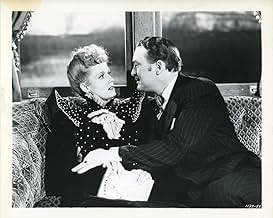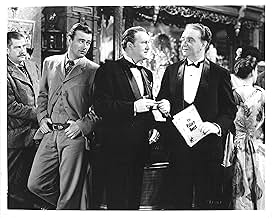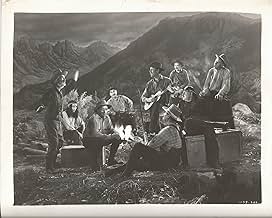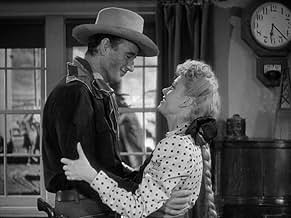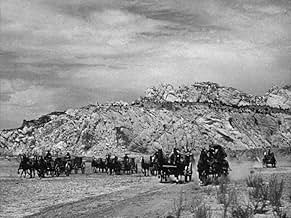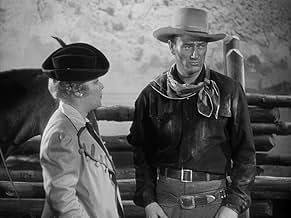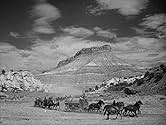NOTE IMDb
6,3/10
1,7 k
MA NOTE
Ajouter une intrigue dans votre langueIn 1906, on Oklahoma's Indian lands, a cowboy fights for oil lease rights against a greedy oilman while a pretty schoolteacher steals both men's hearts.In 1906, on Oklahoma's Indian lands, a cowboy fights for oil lease rights against a greedy oilman while a pretty schoolteacher steals both men's hearts.In 1906, on Oklahoma's Indian lands, a cowboy fights for oil lease rights against a greedy oilman while a pretty schoolteacher steals both men's hearts.
- Réalisation
- Scénario
- Casting principal
- Nommé pour 2 Oscars
- 2 nominations au total
Foncilla Adams
- Girl
- (non crédité)
Stanley Andrews
- Mason - Indian Agent
- (non crédité)
Charles Arnt
- Joe - Train Conductor
- (non crédité)
Avis à la une
A lesser entry in the John Wayne canon, but not without interest. I thought Duke did quite well with the light comedy in the first part of the film before getting tough later on. And he looks as good as he ever did.
I liked the opening scene as the camera panned along the train interior catching the comments of the passengers - including, I'm sure, Guinn "Big Boy" Williams who had a few words to say, though the film doesn't appear in his filmography on this site or in Quinlan.
Albert Dekker is quite a likable villain, and, for the era in which the film was made, it's quite clear what his intentions are towards Martha Scott; the innuendo is strong, and in the hotel she even looks into the room adjoining hers and gasps when she spots the bed where he wants her to end up.
I'm a bit dubious about the total oil capacity of the various wagons at the end of the film and how easily some of the explosions occurred, but the sequence is quite a novel one. And the period - very early 20th century - is an interesting one, with the film making several allusions to the new life-style that will be made possible by oil.
Apparently Rhonda Fleming is in the chorus line in her very first film, and Gabby Hayes isn't too annoying in his customary old coot/sidekick role.
I liked the opening scene as the camera panned along the train interior catching the comments of the passengers - including, I'm sure, Guinn "Big Boy" Williams who had a few words to say, though the film doesn't appear in his filmography on this site or in Quinlan.
Albert Dekker is quite a likable villain, and, for the era in which the film was made, it's quite clear what his intentions are towards Martha Scott; the innuendo is strong, and in the hotel she even looks into the room adjoining hers and gasps when she spots the bed where he wants her to end up.
I'm a bit dubious about the total oil capacity of the various wagons at the end of the film and how easily some of the explosions occurred, but the sequence is quite a novel one. And the period - very early 20th century - is an interesting one, with the film making several allusions to the new life-style that will be made possible by oil.
Apparently Rhonda Fleming is in the chorus line in her very first film, and Gabby Hayes isn't too annoying in his customary old coot/sidekick role.
I didn't expect much from this one but it's better than it has any right being. On the surface it looks like an ordinary, run-of-the-mill B western with cowboy John Wayne leading a revolt against greedy oil baron Albert Dekker. Oh and the obligatory pretty school teacher Martha Scott, who catches the eye of both Wayne and Dekker. But it's actually a fun little movie that captures your attention and never drags. Wayne and Dekker play their white hat/black hat parts well, and Scott is charming with a nice chemistry with Duke. Supporting cast features greats like Gabby Hayes, Marjorie Rambeau, and Paul Fix. And just wait until Teddy Roosevelt shows up. That was my favorite part.
This was Republic's most successful picture of 1943, offering solid if unspectacular entertainment.
It is a somewhat unusual western, being set in the early 20th century and featuring an antagonist (played by Albert Dekker) who is a ruthless businessman rather than the conventional evil villain. Dekker represents modernity and Wayne, of course, the more traditional hard moral man.
The two male leads compete for the heart of a romance writer played by Martha Scott, and for the oil rights of the Indian territory, with Wayne representing a much less predatory way of doing business.
Add some humor and lively action scenes and you get a quite enjoyable product, if a bit formulaic.
It is a somewhat unusual western, being set in the early 20th century and featuring an antagonist (played by Albert Dekker) who is a ruthless businessman rather than the conventional evil villain. Dekker represents modernity and Wayne, of course, the more traditional hard moral man.
The two male leads compete for the heart of a romance writer played by Martha Scott, and for the oil rights of the Indian territory, with Wayne representing a much less predatory way of doing business.
Add some humor and lively action scenes and you get a quite enjoyable product, if a bit formulaic.
Plot-- Business tycoon Gardner wants drilling rights on Indian land and he'll use about every trick to get it. But he's up against the local little guys who've pooled their assets to get the same rights. Luckily they see in cowboy drifter Dan Somers a guy with the potential to lead them even if he doesn't see that potential himself. Plus, Dan and Gardner become rivals over the affections of winsome writer Catherine.
That climatic wagon stampede across the flat prairie still has me dizzy. Great action effect that must have employed every stuntman in Hollywood, to say nothing about every wagon. Now, if Dan (Wayne) doesn't get to the government office first, then the scheming Gardner (Dekker) gets the oil millions. Okay, so Dan's got an edge since the government man likes the ladies more than his duties. But, what great rivals Wayne and Dekker make. Each is an imposing presence, even if Wayne puts on his best "aw shucks" act, while Dekker keeps an icy calm. And I love it when they duel gimlet-eye to gimlet-eye. Still, sweet-face Martha Scott gets as much screen time as the guys, so likely Republic was trying to build her into a star. And, of course, where there's Wayne, Gabby Hayes can't be far behind, doing his unforgettable crusty old coot bit. And catch the pre-Roy Dale Evans bringing down the house with as charming a stage number as many an A-musical. No wonder Roy grabbed her.
All in all, it's a spectacular action flick, even if the romantic interludes get a little tiresome. Wayne sure shows his acting chops, more animated than I've seen him. His cowboy Dan goes from just another prairie drifter to hard-driving trail boss in really convincing fashion. And though he'd probably hate the word, he does it in what amounts to winning fashion. And catch that opening sequence in Gardner's private car. It's unusual and superbly done. Republic popped a bundle for this, and it shows up in the colorful crowd scenes (thanks to director Rogell) and big oil well gushers, along with that final stampede.
I'm not sure why this unusual oater is so obscure in the Wayne canon. But in my book it's as good entertainment as any of his many horse operas. And for fans of crashing buckboards, this is the Promised Land.
That climatic wagon stampede across the flat prairie still has me dizzy. Great action effect that must have employed every stuntman in Hollywood, to say nothing about every wagon. Now, if Dan (Wayne) doesn't get to the government office first, then the scheming Gardner (Dekker) gets the oil millions. Okay, so Dan's got an edge since the government man likes the ladies more than his duties. But, what great rivals Wayne and Dekker make. Each is an imposing presence, even if Wayne puts on his best "aw shucks" act, while Dekker keeps an icy calm. And I love it when they duel gimlet-eye to gimlet-eye. Still, sweet-face Martha Scott gets as much screen time as the guys, so likely Republic was trying to build her into a star. And, of course, where there's Wayne, Gabby Hayes can't be far behind, doing his unforgettable crusty old coot bit. And catch the pre-Roy Dale Evans bringing down the house with as charming a stage number as many an A-musical. No wonder Roy grabbed her.
All in all, it's a spectacular action flick, even if the romantic interludes get a little tiresome. Wayne sure shows his acting chops, more animated than I've seen him. His cowboy Dan goes from just another prairie drifter to hard-driving trail boss in really convincing fashion. And though he'd probably hate the word, he does it in what amounts to winning fashion. And catch that opening sequence in Gardner's private car. It's unusual and superbly done. Republic popped a bundle for this, and it shows up in the colorful crowd scenes (thanks to director Rogell) and big oil well gushers, along with that final stampede.
I'm not sure why this unusual oater is so obscure in the Wayne canon. But in my book it's as good entertainment as any of his many horse operas. And for fans of crashing buckboards, this is the Promised Land.
This film is also very commonly known as "War of the Wildcats". As you watch it, the movie sure looks like a B--but with just a bit more polish, a bit longer running time and a bit more in the way of budget. This is because the film is sort of like a transitional film for Wayne. While he played in a ton of Bs during the 1930s, around 1939 (with "Stagecoach") he began playing in better and better films. But many of them looked a lot like Bs and felt a lot like Bs. His bigger budget studio projects were still a few years ahead.
The film begins with a feminist author (Martha Scott) leaving her tiny town. Apparently the local prudes were angry at her writing such a scandalous romance novel--and you get the impression that it really isn't THAT bad. In fact, it really can't be because Scott is a school teacher and never really lived a worldly life in this town. So, at the urging of the women, she is determined to see the world--and be more like one of her characters. But, she is conflicted and isn't quite sure where to go or what to do. Her dull old aunt wants her to live with her in Kansas City--but when she meets a big-time oil man (Albert Dekker), he convinces her to follow him to the oil fields and promises her wealth and excitement. There are two problems with this. First, Dekker is a bit of a pig and an ego-maniac. Second, John Wayne pops into her life--and back then he was a major hunk. And, since he was the star, it's not especially surprising where it all ends. In the middle portion of the film, Wayne and Dekker vie for power and fight over oil land that the Indians are willing to lease. But Dekker is determined not to play nicely--and seems willing to use some dirty tricks to make sure he alone gets these leases.
Overall, this is not an especially deep film nor is it very realistic. However, it is fun--and that is very important. Gabby Hayes and especially Marjorie Rambeau provide some fun support and color.
The film begins with a feminist author (Martha Scott) leaving her tiny town. Apparently the local prudes were angry at her writing such a scandalous romance novel--and you get the impression that it really isn't THAT bad. In fact, it really can't be because Scott is a school teacher and never really lived a worldly life in this town. So, at the urging of the women, she is determined to see the world--and be more like one of her characters. But, she is conflicted and isn't quite sure where to go or what to do. Her dull old aunt wants her to live with her in Kansas City--but when she meets a big-time oil man (Albert Dekker), he convinces her to follow him to the oil fields and promises her wealth and excitement. There are two problems with this. First, Dekker is a bit of a pig and an ego-maniac. Second, John Wayne pops into her life--and back then he was a major hunk. And, since he was the star, it's not especially surprising where it all ends. In the middle portion of the film, Wayne and Dekker vie for power and fight over oil land that the Indians are willing to lease. But Dekker is determined not to play nicely--and seems willing to use some dirty tricks to make sure he alone gets these leases.
Overall, this is not an especially deep film nor is it very realistic. However, it is fun--and that is very important. Gabby Hayes and especially Marjorie Rambeau provide some fun support and color.
Le saviez-vous
- AnecdotesSidney Blackmer made a career out of playing Teddy Roosevelt. He played him eight times in various film projects. 1-"This Is My Affair" (1937) 2-"The Monroe Doctrine" (1939) 3-"Teddy the Rough Rider" (1940) 4-"March On, America!" (1942) 5-"In Old Oklahoma" (1943), 6-"Bill "Buffalo Bill" (1944) 7-"My Girl Tisa" (1948) 8-"Never Kick a Man Upstairs" (TV Movie) (1953).
- Citations
Bessie Baxter: We've got a long way to go, and a short time to get there.
- ConnexionsEdited into Six Gun Theater: In Old Oklahoma (2021)
Meilleurs choix
Connectez-vous pour évaluer et suivre la liste de favoris afin de recevoir des recommandations personnalisées
- How long is In Old Oklahoma?Alimenté par Alexa
Détails
- Durée1 heure 42 minutes
- Couleur
- Rapport de forme
- 1.37 : 1
Contribuer à cette page
Suggérer une modification ou ajouter du contenu manquant


